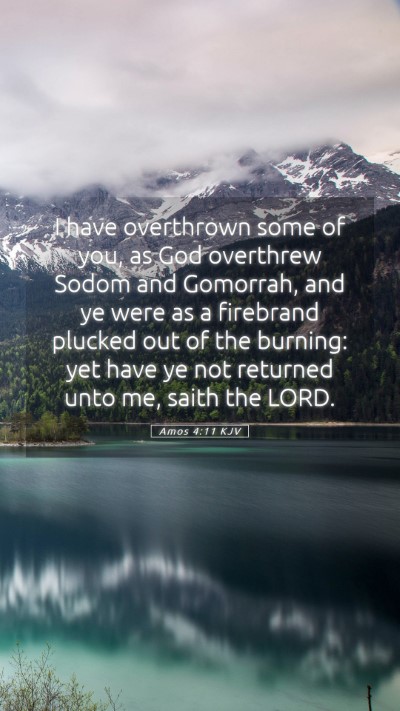Old Testament
Genesis Exodus Leviticus Numbers Deuteronomy Joshua Judges Ruth 1 Samuel 2 Samuel 1 Kings 2 Kings 1 Chronicles 2 Chronicles Ezra Nehemiah Esther Job Psalms Proverbs Ecclesiastes Song of Solomon Isaiah Jeremiah Lamentations Ezekiel Daniel Hosea Joel Amos Obadiah Jonah Micah Nahum Habakkuk Zephaniah Haggai Zechariah MalachiAmos 4:11 Meaning
What is the meaning of Amos 4:11?
I have overthrown some of you, as God overthrew Sodom and Gomorrah, and ye were as a firebrand plucked out of the burning: yet have ye not returned unto me, saith the LORD.
Amos 4:11 Bible Verse Meaning
Understanding Amos 4:11
Amos 4:11 states: "I overthrew some of you, as God overthrew Sodom and Gomorrah; and ye were as a firebrand plucked out of the burning: yet have ye not returned unto me, saith the Lord."
This verse serves as a solemn reminder of God's judgment and His call for repentance. Here, the prophet Amos conveys the severity of Israel's situation, where the nation faced divine retribution akin to the destruction of Sodom and Gomorrah. Below is a combined insight from public domain commentaries regarding the meaning of this verse.
Contextual Background
Amos is one of the Minor Prophets in the Old Testament, addressing the Northern Kingdom of Israel. His prophecies occurred during a time of prosperity and moral decay, where social injustices and idolatry were rampant. The historical context of Amos 4:11 highlights the people's complacency despite imminent judgment.
Verse Analysis
- Divine Judgment: Matthew Henry emphasizes that God's actions in overthrowing certain individuals were analogous to the destruction of Sodom and Gomorrah. This highlights the absolute power of God over nations and individuals who turn away from Him.
- God's Merciful Interventions: Albert Barnes notes that the phrase "were as a firebrand plucked out of the burning" points to God's mercy in sparing some individuals from complete destruction. This metaphor illustrates God’s willingness to save rather than annihilate.
- Call to Repentance: Adam Clarke discusses that the repeated phrase "yet have ye not returned unto me" reveals God's desire for reconciliation. Despite witnessing God's judgment, the people persist in their sinful ways, indicating a stubbornness to repent.
Theological Implications
This verse serves as a crucial theological reflection on divine justice and mercy. It implores individuals to reflect on their spiritual condition and the consequences of sin. The call to repentance is a recurring theme in Scripture, emphasized by God’s prophets throughout Israel’s history.
Application of the Verse
The implications of Amos 4:11 extend beyond ancient Israel. Today's readers are challenged to examine their lives in light of God's righteousness and mercy. The phrase "returned unto me" carries substantial weight, urging believers to seek a relationship with God and turn from sinful practices.
Cross References
- Sodom and Gomorrah's Destruction: Genesis 19:24-25
- The Necessity of Repentance: Ezekiel 18:30
- God's Patience and Mercy: 2 Peter 3:9
Conclusion
Amos 4:11 encapsulates the essence of God’s warning to His people through prophetic voices. The verse invites introspection, urging believers to recognize the seriousness of sin and the greatness of divine mercy. Understanding Scripture like this passage allows modern readers to not only comprehend historical contexts but also apply biblical truths to contemporary life.
Further Study Resources
- Bible study groups focusing on the Minor Prophets
- Online Bible study tools for deeper exploration of scripture
- Bible study guides to enhance personal or group study of prophetic writings


